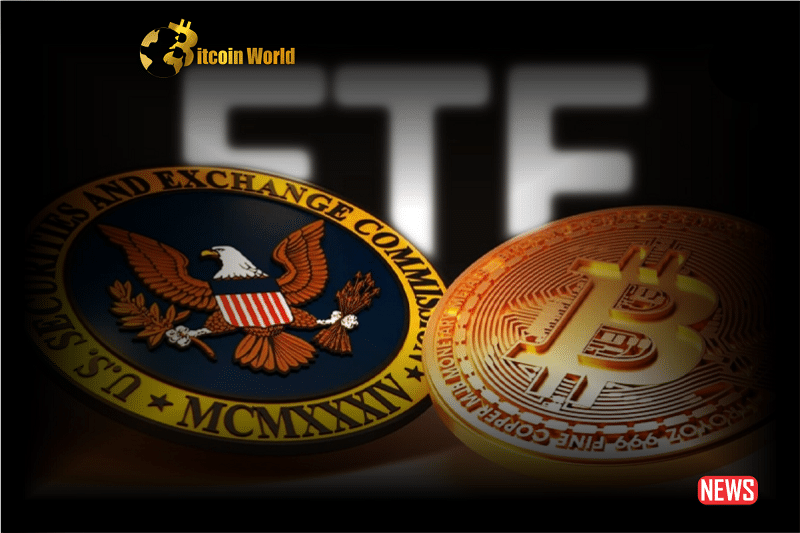The crypto world is buzzing, and for good reason. Imagine a rare moment of bipartisan agreement in Washington D.C. It’s happening right now, and it’s all focused on one thing: Bitcoin ETFs. Yes, you heard that right. Members of Congress, across party lines, are turning up the heat on Securities and Exchange Commission (SEC) Chair Gary Gensler. Their message is loud and clear: Approve Bitcoin spot exchange-traded funds (ETFs) and level the playing field for crypto investors.
Why is Congress Putting Pressure on the SEC for Bitcoin ETFs?
This isn’t just a casual suggestion; it’s a concerted effort. These influential letters from Capitol Hill landed on Gensler’s desk just before his appearance before the House Financial Services Committee. Why the urgency? Lawmakers believe the SEC’s current stance is not only inconsistent but also detrimental to investor protection in the rapidly evolving cryptocurrency market.
- Investor Protection is Paramount: A core argument from Congress is that denying spot Bitcoin ETFs actually harms investors. By not approving these regulated investment vehicles, the SEC pushes investors towards potentially riskier, unregulated avenues for Bitcoin exposure.
- Leveling the Playing Field: The letters emphasize the need for equitable treatment within the crypto market. The implication is that the SEC’s reluctance on spot Bitcoin ETFs, while allowing futures-based Bitcoin ETFs, creates an uneven playing field.
- Following the Court’s Lead: Remember the Grayscale victory against the SEC? Congress certainly does. The court ruling highlighted the SEC’s flawed logic in rejecting Grayscale’s spot Bitcoin ETF application. Lawmakers are pointing to this ruling as a key reason for the SEC to reconsider and align its actions with judicial opinion.

What Did the Lawmakers Actually Say? Key Highlights from the Congressional Letters
Let’s break down the key points from these significant letters:
The Bipartisan Push for Approval
Representatives Tom Emmer, Mike Flood, Wiley Nickel, and Ritchie Torres penned a powerful letter emphasizing the SEC’s duty. Their main points included:
- SEC’s Responsibility: The SEC must balance investor protection with enabling access to innovative investment products. They can’t be gatekeepers against progress.
- Grayscale Case as Precedent: The court’s decision against the SEC was a wake-up call. The SEC’s rejection of spot Bitcoin ETFs was deemed inconsistent and biased.
- Spot ETFs for Transparency and Safety: Congress believes spot Bitcoin ETFs are a step towards greater transparency and enhanced investor protection in Bitcoin trading.
- Following Gensler’s Own Advice: Lawmakers pointed out that market participants have registered with the SEC, answering Gensler’s call for compliance. Now, they argue, it’s the SEC’s turn to approve compliant products.
GOP Concerns and Calls for Review
In a separate, unified Republican communication, a different angle emerged. While also concerned about the SEC’s approach, their letter focused on:
- Stakeholder Feedback and Economic Impact: The GOP members raised concerns about the broader economic consequences of the SEC’s regulatory actions and the need to properly consider feedback from all stakeholders.
- Temporary Suspension for Comprehensive Review: They advocated for a pause on new licensing or implementation to allow for a thorough review. This review would include:
- Cost-Benefit Analysis: A detailed examination of the economic costs and benefits of current and proposed regulations.
- Community Input: Careful consideration of comments and feedback from the crypto community and experts.
- Complexity Assessment: Analyzing potential complexities and unintended consequences of regulations.
- Focus on Smaller Investors and Capital Formation: The goal of this review is to create proposals that better serve smaller investors and foster capital formation within the crypto space.
Chairman McHenry’s Scrutiny: Is Gensler Being Held Accountable?
Adding to the pressure cooker environment, House Financial Services Committee Chairman Patrick McHenry has been a vocal critic during the hearing. His frustration with what he perceives as Gensler’s lack of responsiveness to oversight requests was palpable. McHenry even hinted at the possibility of a congressional subpoena – a serious escalation that underscores the gravity of the situation.
Democrats vs. Republicans on Gensler: A Divided House?
While there’s bipartisan agreement on Bitcoin ETFs, the broader picture of Gensler’s performance at the SEC reveals a clear partisan divide. The level of impatience from lawmakers on both sides, however, is undeniable. This suggests a growing unease with the SEC’s overall approach to crypto regulation, even if their specific concerns and proposed solutions differ.
Bitcoin’s Classification: Security or Not? Gensler’s Take
A crucial point of clarification emerged during the hearing. Is Bitcoin a security? Gary Gensler addressed this directly, stating that Bitcoin, according to his understanding, does not meet the criteria of the Howey Test. This test is the established legal standard for determining if an asset qualifies as a security under US law. Gensler’s affirmation on Bitcoin’s non-security status is significant, although it doesn’t necessarily extend to all other cryptocurrencies.
What’s Next? The Future of Bitcoin ETFs and Crypto Regulation Hangs in the Balance
All eyes are now glued to Chair Gensler and the SEC. How will they respond to this mounting congressional pressure? The decisions made in the coming weeks and months will have a profound impact on:
- The fate of Bitcoin spot ETFs: Will the SEC finally approve them, opening up Bitcoin investment to a wider audience through regulated channels?
- The broader regulatory landscape for cryptocurrencies: Will this congressional push lead to a more balanced and pragmatic approach to crypto regulation, fostering innovation while protecting investors?
- The SEC’s credibility: How the SEC navigates this situation will shape perceptions of its effectiveness and responsiveness to both Congress and the evolving financial landscape.
This is a pivotal moment for Bitcoin, for crypto, and for the future of financial regulation in the digital age. Stay tuned – the story is far from over.
Disclaimer: The information provided is not trading advice, Bitcoinworld.co.in holds no liability for any investments made based on the information provided on this page. We strongly recommend independent research and/or consultation with a qualified professional before making any investment decisions.


